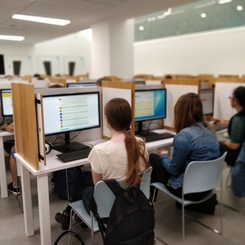From the paper Competitive Compensation and Subjective Well-Being; the Effect of Culture and Gender
In this paper, professors SeEun Jung (Inha University, South Korea) and Radu Vranceanu (ESSEC Business School, France) report data from a real effort experiment designed to study how subjects in two different countries, Korea and France, react to tournament incentives and winning. The controlled experiment they developed allows them to investigate how people exposed to competition in the workplace react in terms of well-being, and how this translates into differences in productivity. Let us find out.
Is There Such a Thing as Happiness at Work?
Here is some food for thought: is individual productivity related to happiness at work? In the social sciences, this is one of the central research questions. And one of the most difficult to address. Psychologists have observed that subjective well-being is partly related to individual productivity. However, it remains extremely difficult to be certain about the causality between the two. Here is another interesting fact: traditional labor economics acknowledges that an individual’s satisfaction positively depends on their consumption and leisure time. In this context, work is a source of pain and discomfort, but it also generates income. With a few exceptions, economists used to pay limited attention to the motivation effect of the wage on effort. Experimental and behavioral research has since revealed that the nature of the compensation system and the individuals’ distance to money are important determinants of the relationship between performance and well-being. It does not come as a surprise but money rewards not only provide incentives to act in line with employers’ goals but also can be a source of conflict.
The Racing State of Mind
In the post-industrial developed economies, many jobs and work situations compensate people based on a tournament mechanism in which the reward depends on the rank instead of being a monotonic function of performance. Examples of tournament pay abound: promotions to scarce top-executive positions, salesman special bonuses for top performers, employees competing for the most interesting projects, large rewards for winners of the race for patents, a strong reputation for scholars who are the first to publish original research, etc. Being exposed to competition in the workplace is not an innocuous process, as both the “racing mindset” and the outcome of the race can activate powerful emotions, positive or negative, with lasting effects on productivity.
Literature in economic psychology has already revealed that emotions can impact behavior in tournaments, particularly when these ranked-order contests involve monetary incentives that are powerful triggers of conflict. Other studies emphasized that men and women can respond differently to competition in the workplace, and these differences can be grounded their taste for competition. The fact that women tend to shy away from competition seems to be resilient to controlling for ”usual suspects” such as risk aversion, overconfidence, and individual performance.
In building a controlled experiment, Radu Vranceanu and SeEun Jung aimed to address similar questions. They decided to take advantage of the location of their respective schools and collect observations both in France and Korea, namely, a European and an Asian country of similar economic development but of different cultures. Indeed, in light of the six-dimensional analysis of national culture pioneered by Hofstede (2001), France appears to be characterized by a highly individualistic/independent culture, and Korea by a highly collectivistic/interdependent one, similar to many other Asian countries. In the first stage of the experiment, subjects perform a standard adding-number task and are paid a piece rate individually. In the second stage, individuals are assigned to pairs at random; they execute the task individually but are paid under a winner-take-all compensation scheme. In a third stage, participants execute the task and are once again paid a piece rate individually. Before each of the three stages, Radu and SeEun used the IWP Multi-Affect Indicator (Warr et al. 2014) to measure subjective well-being, defined as a combination of pleasure and activation, based on the standard circumplex model of affect.
Context, Culture and Gender
Their results show that, even in an elementary production process, gender and culture play an important role in the relationship between subjective well-being and productivity.
Exposure to the tournament (slightly) improves the overall well-being in the Korean sample and decreases it in France. This result is driven essentially by the opposite responses of female subjects, with Korean women enjoying the tournament, and French women disliking it.
As expected, winning (losing) the tournament increases (decreases) well-being, and this effect is observed in both countries.
The change in mood is not without consequences for ex-post productivity. An increase in subjective well-being after the tournament is associated with a rise in the productivity of French students, and this effect is primarily observed in the male population; a similar positive relationship is detected in the sample of female Korean subjects, but not in the overall sample of Korean subjects.
Thus, the relative weight of incentives and emotions in decision-making can be very sensitive to the context, and subjects can react differently depending on their gender and cultural background. These claims might not be seen as extremely original, but they should be kept in mind when trying to generalize behaviors detected in samples of subjects belonging to one (Western) culture, to broader categories of subjects (men or women, for instance) of different cultures, which is one of the documented sins of existing experimental research









